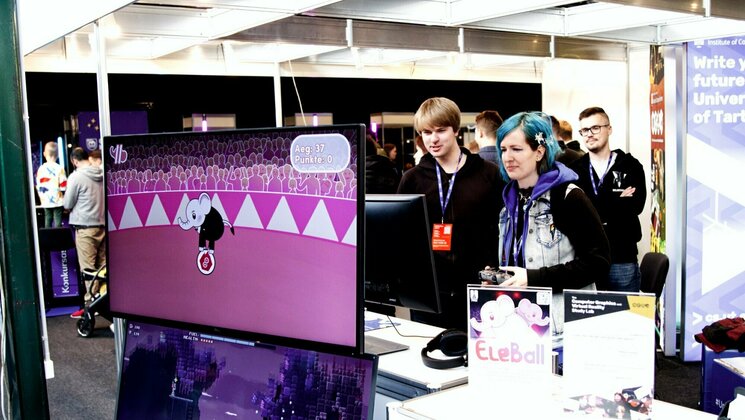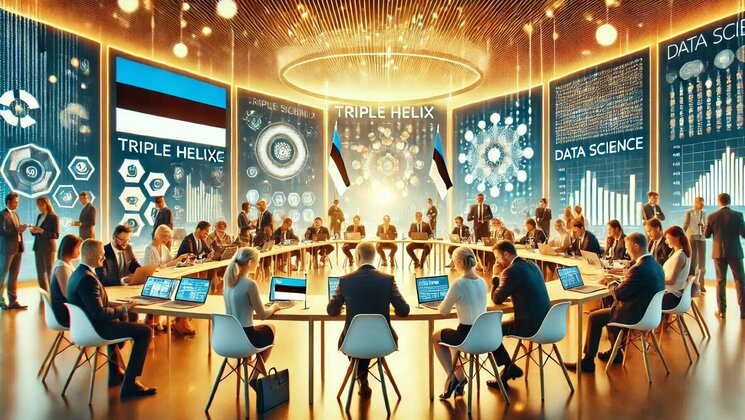-
Faculty of Arts and HumanitiesDean's Office, Faculty of Arts and HumanitiesJakobi 2, r 116-121 51005 Tartu linn, Tartu linn, Tartumaa EST0Institute of History and ArchaeologyJakobi 2 51005 Tartu linn, Tartu linn, Tartumaa EST0Institute of Estonian and General LinguisticsJakobi 2, IV korrus 51005 Tartu linn, Tartu linn, Tartumaa EST0Institute of Philosophy and SemioticsJakobi 2, III korrus, ruumid 302-337 51005 Tartu linn, Tartu linn, Tartumaa EST0Institute of Cultural ResearchÜlikooli 16 51003 Tartu linn, Tartu linn, Tartumaa EST0Institute of Foreign Languages and CulturesLossi 3 51003 Tartu linn, Tartu linn, Tartumaa EST0School of Theology and Religious StudiesÜlikooli 18 50090 Tartu linn, Tartu linn, Tartumaa EST0Viljandi Culture AcademyPosti 1 71004 Viljandi linn, Viljandimaa EST0Professors emeriti, Faculty of Arts and Humanities0Associate Professors emeriti, Faculty of Arts and Humanities0Faculty of Social SciencesDean's Office, Faculty of Social SciencesLossi 36 51003 Tartu linn, Tartu linn, Tartumaa EST0Institute of EducationJakobi 5 51005 Tartu linn, Tartu linn, Tartumaa EST0Johan Skytte Institute of Political StudiesLossi 36, ruum 301 51003 Tartu linn, Tartu linn, Tartumaa EST0School of Economics and Business AdministrationNarva mnt 18 51009 Tartu linn, Tartu linn, Tartumaa EST0Institute of PsychologyNäituse 2 50409 Tartu linn, Tartu linn, Tartumaa EST0School of LawNäituse 20 - 324 50409 Tartu linn, Tartu linn, Tartumaa EST0Institute of Social StudiesLossi 36 51003 Tartu linn, Tartu linn, Tartumaa EST0Narva CollegeRaekoja plats 2 20307 Narva linn, Ida-Virumaa EST0Pärnu CollegeRingi 35 80012 Pärnu linn, Pärnu linn, Pärnumaa EST0Professors emeriti, Faculty of Social Sciences0Associate Professors emeriti, Faculty of Social Sciences0Faculty of MedicineDean's Office, Faculty of MedicineRavila 19 50411 Tartu linn, Tartu linn, Tartumaa ESTInstitute of Biomedicine and Translational MedicineBiomeedikum, Ravila 19 50411 Tartu linn, Tartu linn, Tartumaa ESTInstitute of PharmacyNooruse 1 50411 Tartu linn, Tartu linn, Tartumaa ESTInstitute of DentistryL. Puusepa 1a 50406 Tartu linn, Tartu linn, Tartumaa ESTInstitute of Clinical MedicineL. Puusepa 8 50406 Tartu linn, Tartu linn, Tartumaa ESTInstitute of Family Medicine and Public HealthRavila 19 50411 Tartu linn, Tartu linn, Tartumaa ESTInstitute of Sport Sciences and PhysiotherapyUjula 4 51008 Tartu linn, Tartu linn, Tartumaa ESTProfessors emeriti, Faculty of Medicine0Associate Professors emeriti, Faculty of Medicine0Faculty of Science and TechnologyDean's Office, Faculty of Science and TechnologyVanemuise 46 - 208 51003 Tartu linn, Tartu linn, Tartumaa ESTInstitute of Computer ScienceNarva mnt 18 51009 Tartu linn, Tartu linn, Tartumaa ESTInstitute of GenomicsRiia 23b/2 51010 Tartu linn, Tartu linn, Tartumaa ESTEstonian Marine Institute0Institute of PhysicsInstitute of ChemistryRavila 14a 50411 Tartu linn, Tartu linn, Tartumaa EST0Institute of Mathematics and StatisticsNarva mnt 18 51009 Tartu linn, Tartu linn, Tartumaa EST0Institute of Molecular and Cell BiologyRiia 23, 23b - 134 51010 Tartu linn, Tartu linn, Tartumaa ESTTartu ObservatoryObservatooriumi 1 61602 Tõravere alevik, Nõo vald, Tartumaa EST0Institute of TechnologyNooruse 1 50411 Tartu linn, Tartu linn, Tartumaa ESTInstitute of Ecology and Earth SciencesJ. Liivi tn 2 50409 Tartu linn, Tartu linn, Tartumaa ESTProfessors emeriti, Faculty of Science and Technology0Associate Professors emeriti, Faculty of Science and Technology0Institute of BioengineeringArea of Academic SecretaryHuman Resources OfficeUppsala 6, Lossi 36 51003 Tartu linn, Tartu linn, Tartumaa EST0Area of Head of FinanceFinance Office0Area of Director of AdministrationInformation Technology Office0Administrative OfficeÜlikooli 17 (III korrus) 51005 Tartu linn, Tartu linn, Tartumaa EST0Estates Office0Marketing and Communication OfficeÜlikooli 18, ruumid 102, 104, 209, 210 50090 Tartu linn, Tartu linn, Tartumaa EST0Area of RectorRector's Strategy OfficeInternal Audit OfficeArea of Vice Rector for Academic AffairsOffice of Academic AffairsUniversity of Tartu Youth AcademyUppsala 10 51003 Tartu linn, Tartu linn, Tartumaa EST0Student Union OfficeÜlikooli 18b 51005 Tartu linn, Tartu linn, Tartumaa EST0Centre for Learning and TeachingArea of Vice Rector for ResearchUniversity of Tartu LibraryW. Struve 1 50091 Tartu linn, Tartu linn, Tartumaa EST0Grant OfficeArea of Vice Rector for DevelopmentCentre for Entrepreneurship and InnovationNarva mnt 18 51009 Tartu linn, Tartu linn, Tartumaa EST0University of Tartu Natural History Museum and Botanical GardenVanemuise 46 51003 Tartu linn, Tartu linn, Tartumaa EST0International Cooperation and Protocol Office0University of Tartu MuseumLossi 25 51003 Tartu linn, Tartu linn, Tartumaa EST0
Yuliia Siur shares her experience in the Industrial Master's Programme in IT
Yuliia Siur graduated from the Computer Science Master’s Programme and completed the Industrial Master’s Programme in IT at the Institute of Computer Science. As a part of the programme, she spent 11 months working with Eesti Energia. The experience taught her a lot, and she was happy to share it with us.
"When I started the Industrial Master's Programme in IT at Eesti Energia, I didn't have any experience in the energy sector. However, I was genuinely interested in it due to the growing focus on green energy. I chose a project to forecast the net consumption (difference in energy import and export) for Estonian prosumers who both produce (solar energy) and consume energy.
The Industrial Master’s Programme was incredibly beneficial for me. It ensured a balanced time distribution, so I had enough time with the company and for my classes. Having two supervisors—one from the university and one from the company—was also a great advantage. Their different perspectives, academic and business, helped me learn how to solve business problems with scientific solutions and find a balance between these two approaches.
While working on my thesis Prosumer Net Consumption Forecasting: The Impact of Behind-the-Meter Self-Consumption and Weather Forecast, I found an important but overlooked topic: the impact of on-site consumption, or self-consumption, of unmeasured solar energy, on forecasting energy import and export in prosumers. In my thesis, we evaluated existing methods and proposed a new approach to address this hidden self-consumption, showing our method's partial superiority.
In the research, I focused on the development of a day-ahead net consumption forecasting technique using data from Estonian prosumers. I presented additive and integrated models with various new features aimed at mitigating uncertainty arising from weather forecast variables and unmeasured self-consumption. The approach enabled models to efficiently capture complex relationships between input and target variables. The experimental results provided empirical evidence that the uncertainty arising from weather predictions and unmeasured self-consumption is improved in our consumption model developed for the additive method.
Moreover, I had the opportunity to present my work at the 44th International Symposium on Forecasting. My speech focused on exploring existing methods for net consumption forecasting, considering the impact of unmeasured self-consumption. I was amazed by the interest it caused. Discussions with specialists from various countries (Sweden, Turkey, Saudi Arabia, etc.) revealed that the influence of unmetered self-consumption is relevant not only in Estonia but globally.
Overall, joining the Industrial Master’s Programme in IT was one of my best decisions. It allowed me to work with Eesti Energia, gain deep insights into the energy sector from academic and business perspectives, and meet amazing people who supported my growth. I'm excited to continue developing as a Data Scientist in the energy sector, stay with Eesti Energia, and pursue my research as a hobby."
We are looking for companies to join the Industrial Master's Programme in IT as partners! Find more info on the programme. If interested, contact Mari-Anne Suurpere (mari-anne.suurpere@ut.ee).

Computer Graphics Expo 2025

